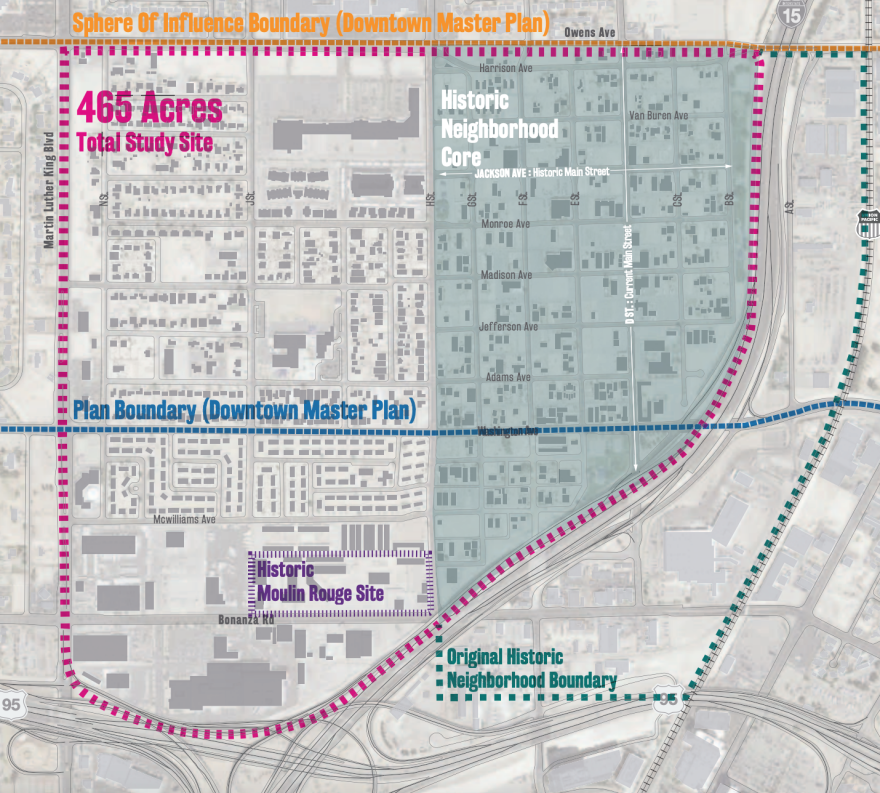Remember the lines of cars for food banks during the pandemic? People drove miles then waited hours because they were out of work, had little money and some food staples were just in short supply.
Now imagine if it was like that every day, where you’d drive miles because, while your neighborhood has plenty of fast food joints, it doesn’t have a supermarket. Now imagine you don’t have a car as well.
One in four residents in Las Vegas’ Historic Westside are food insecure, meaning they have no or little access to healthy food.
The city is trying to change that, and we’ll get into what’s going on there.

Las Vegas City Councilman Cedric Crear and Clark County commissioner William McCurdy II will be with State of Nevada host Joe Schoenmann to answer your questions. But we’ll start with Tyler D. Parry, assistant professor of African American and African diaspora studies at UNLV. He’s also vice president of the African American Intellectual History Society.
Parry said the way history connects to modern poverty “is by design.”
“This does not occur just by accident. I mean, the Westside, primarily because it was home to a majority African American population, meant that the city effectively ignored its developments,” he explained. “African Americans essentially find that the government is intentionally ignoring this area. And this will also lead to a devaluation of homes that are built on the Westside. And so it's very difficult for African Americans to effectively build intergenerational wealth, both through the policies that prevent homeownership and other areas of the city, as well as the devaluation of the homes and the prices that exist within the Westside.”
There have been many efforts over the past two decades-plus to establish a major supermarket chain, but the much smaller Mario’s Market has served the community in the meantime. With a $1 million investment, Mario’s is in the process of moving to the nearby former CVS with plans to double its workforce.
Why has it been such a challenge? Parry explains, “You can't detach the realities of food desert from other conditions that also impact these communities. Namely that, educational infrastructure, problems with policing and mass incarceration, problems with intergenerational wealth, abilities for transportation, you can't build a grocery store in an area that already has issues, perhaps with public transportation, or the lack of vehicles available to residents, a lack of employment opportunities, and expect it to succeed. You have to kind of rebuild and really reimagine and revolutionize the entire infrastructure of this community.”

Crear, who oversees Las Vegas’ Ward 5, has been pushing to implement what’s known as the Hundred Plan.
“We created the plan. It's not a government plan. It is a community-driven plan that we're pushing forward. My job is to keep the foot on the pedal and keep us moving forward. We are [not] going to let obstacles get in the way, whether it's COVID, whether it's a recession, get in the way of us executing. And I think that dedicated leadership, and I think that dedicated commitment to the community, is what we have now and that's why we find it so much success.”
So far, he said the city has reestablished James Gay Park, and they’re in the process of building an educational agricultural space there. Phase three, he said, is going to be a three or four-story tall hydroponic grow facility that “will allow us to increase our crop production” as well as create workforce housing.
Crear said addressing food insecurity is only one part, as is workforce development and mitigating homelessness.
“Nevada received nearly $4 billion thanks to our federal delegation,” McCurdy said. “But Clark County received nearly $440 million, and we prioritize … housing … broadband infrastructure and connectivity in our most at-risk communities … but also, we're going to focus on making sure that we're supporting small businesses and making sure that they have the resources that they need to be more resilient as well.”
And there are many community organizations working to relieve food insecurities in the area. One of them is The Obodo Collective Las Vegas, run by executive director Tameka Henry and programs coordinator Cheyenne Kyle.
Here’s how Kyle described what they do: “We have to understand that food insecurity is a symptom of poverty, and it never exists outside of poverty. … When you look in this neighborhood, you see the symptoms of the reason that there hasn't been grocery stores over here … they tend to go [where] they feel like they are going to receive a profit, right? … There's plenty of gas stations and liquor stores. … It's not that there hasn't been any sort of development, but that the intentional investment into this community and into the health and well-being of this community. It cannot just come from putting up a building. It has to be something that we have to try to edify the members that live over here. We have to talk to them, we have to empower them. And that is what I specifically do here at our urban farm.”
McCurdy said federal funds from the pandemic have been key in keeping some of these projects moving along.
“I believe that you're seeing this type of energy and momentum is simply due to the fact that we have so much money infused into our economy. And we're utilizing those dollars by the mandate that, instead within the passage of the law, it has to be infused into low-income census tracts and that's exactly what we're doing.”
Hear the full interview above.
Guests: Cedric Crear, Las Vegas City Councilman Ward 5 city councilman, Las Vegas; William McCurdy II, District D commissioner, Clark County; Tyler D. Parry, assistant professor of African American and African diaspora studies, UNLV, and vice president, African American Intellectual History Society; Tameka Henry, executive director, and Cheyenne Kyle, programs coordinator, The Obodo Collective Las Vegas






